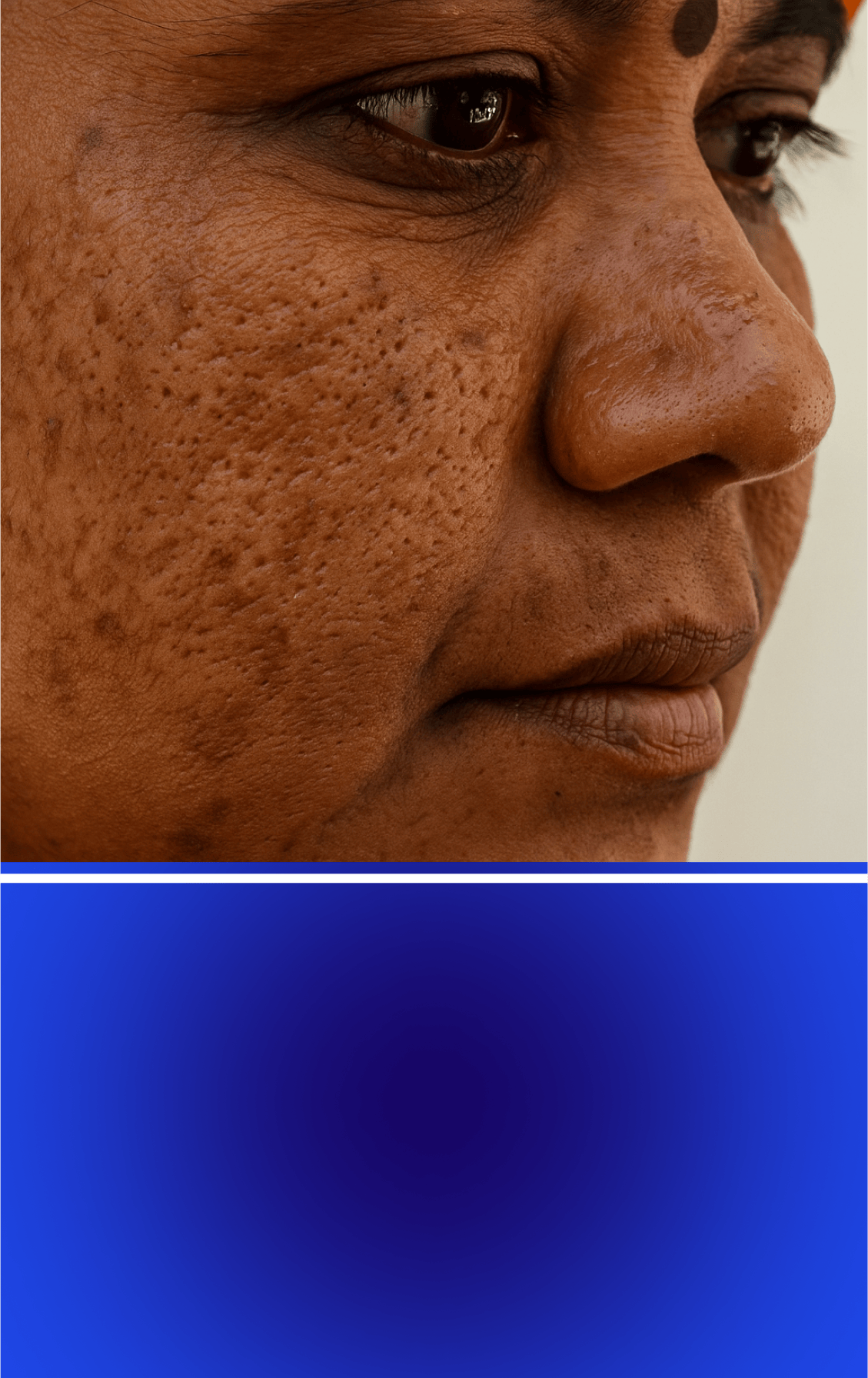Imagine dealing with constant itching, burning, and thick flakes on your scalp that no regular shampoo seems to fix. That's the daily reality for people living with scalp psoriasis, a chronic autoimmune condition that affects not just your skin but also your confidence.
Psoriasis affects approximately 2–3% of the population worldwide, and scalp psoriasis is a common initial presentation, occurring in nearly 80% of people with psoriasis. It's more than a cosmetic issue; untreated scalp psoriasis can lead to infections, hair loss, and significant emotional stress.
If you've been wondering what's happening with your scalp and how to manage it, you're not alone. In this article, you'll learn the symptoms, causes, diagnosis, and effective scalp psoriasis treatment options to help you take control of your skin health.
At a glance:
- Scalp psoriasis is an autoimmune condition causing rapid skin cell buildup, leading to thick plaques, itching, and redness.
- Common triggers include genetics, stress, cold weather, and certain medications or infections.
- If untreated, it can cause infections, hair loss, sleep disruption, and emotional stress.
- Treatments range from medicated shampoos and topical steroids to advanced options like biologics and phototherapy.
- Lifestyle care, such as gentle scalp routines, stress management, and diet adjustments, supports medical treatment.
- Unlike dandruff, scalp psoriasis requires dermatologist-led care for long-term relief.
What Is Scalp Psoriasis?
Scalp psoriasis is a chronic inflammatory skin condition where your immune system mistakenly accelerates skin cell production. This leads to red patches, thick scales, and persistent discomfort on the scalp. Unlike common dandruff, scalp psoriasis is an autoimmune condition that requires structured treatment.
Think of it as your immune system hitting the "fast forward" button on skin renewal. Instead of shedding naturally, excess skin cells pile up, causing visible plaques and irritation. Recognising this mechanism is the first step to addressing it properly.
Also Read: Psoriasis Symptoms, Causes, and Treatment Options
Next, let's look at common symptoms of scalp psoriasis.
Common Symptoms of Scalp Psoriasis

Scalp psoriasis can appear in different ways depending on severity, but it usually goes beyond simple dryness or flaking. Understanding the specific signs helps you recognise the condition early and seek timely scalp psoriasis treatment.
When it comes to symptoms, here's what you should look out for:
- Red patches with thick, silvery-white scales: These raised areas often extend beyond your hairline and may appear on the forehead, back of the neck, or around the ears.
- Persistent itching and burning sensations: The discomfort is usually intense and worsens during flare-ups, sometimes disrupting sleep or daily tasks.
- Temporary hair shedding: Scratching and inflammation can weaken hair at the roots, leading to noticeable thinning or patchy hair loss in affected areas.
- Dryness and flaking: Unlike dandruff, the flakes are larger, drier, and cling stubbornly to the scalp or hair shafts.
- Scalp sensitivity and soreness: You may feel tenderness or pain when combing, washing, or even touching your scalp.
Recognising these symptoms is the first step in managing the condition effectively. Next, let's explore what actually causes scalp psoriasis and the risk factors that may trigger it.
Causes and Risk Factors
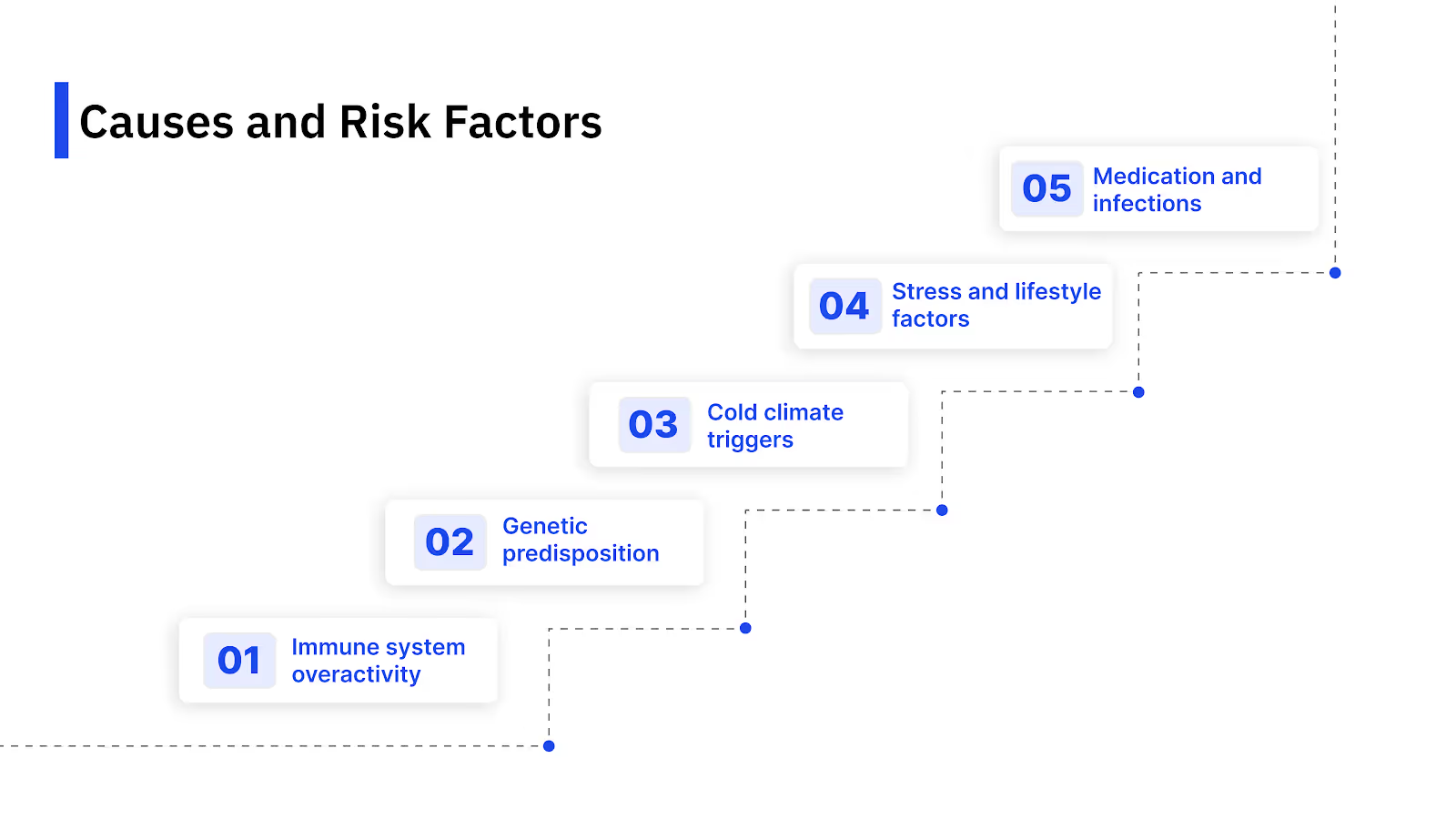
Scalp psoriasis doesn't stem from poor hygiene or simple irritation. Instead, it's a chronic autoimmune condition where several factors play a role. Knowing the causes and risk factors helps you manage flare-ups and identify what might worsen your condition.
To understand why you may be experiencing it, here are the key causes and risk factors:
- Immune system overactivity: Instead of renewing skin cells in 28 days, your body produces them in just 3–4 days, causing thick plaques to form on the scalp.
- Genetic predisposition: If one or both parents have psoriasis, your chances of developing scalp psoriasis rise by up to 30%, making family history an important risk factor.
- Cold climate triggers: Patients often notice worsening redness and scaling during the winter months due to dry air and lack of sunlight exposure.
- Stress and lifestyle factors: High stress levels, irregular sleep, and smoking are strongly linked to flare-ups and slower healing responses.
- Medication and infections: Beta-blockers, lithium, or throat infections like strep are known to spark scalp psoriasis in vulnerable individuals.
Understanding these causes helps you identify personal triggers and take preventive measures. With triggers identified, the next step is knowing how a dermatologist confirms scalp psoriasis through diagnosis.
How Is Scalp Psoriasis Diagnosed?
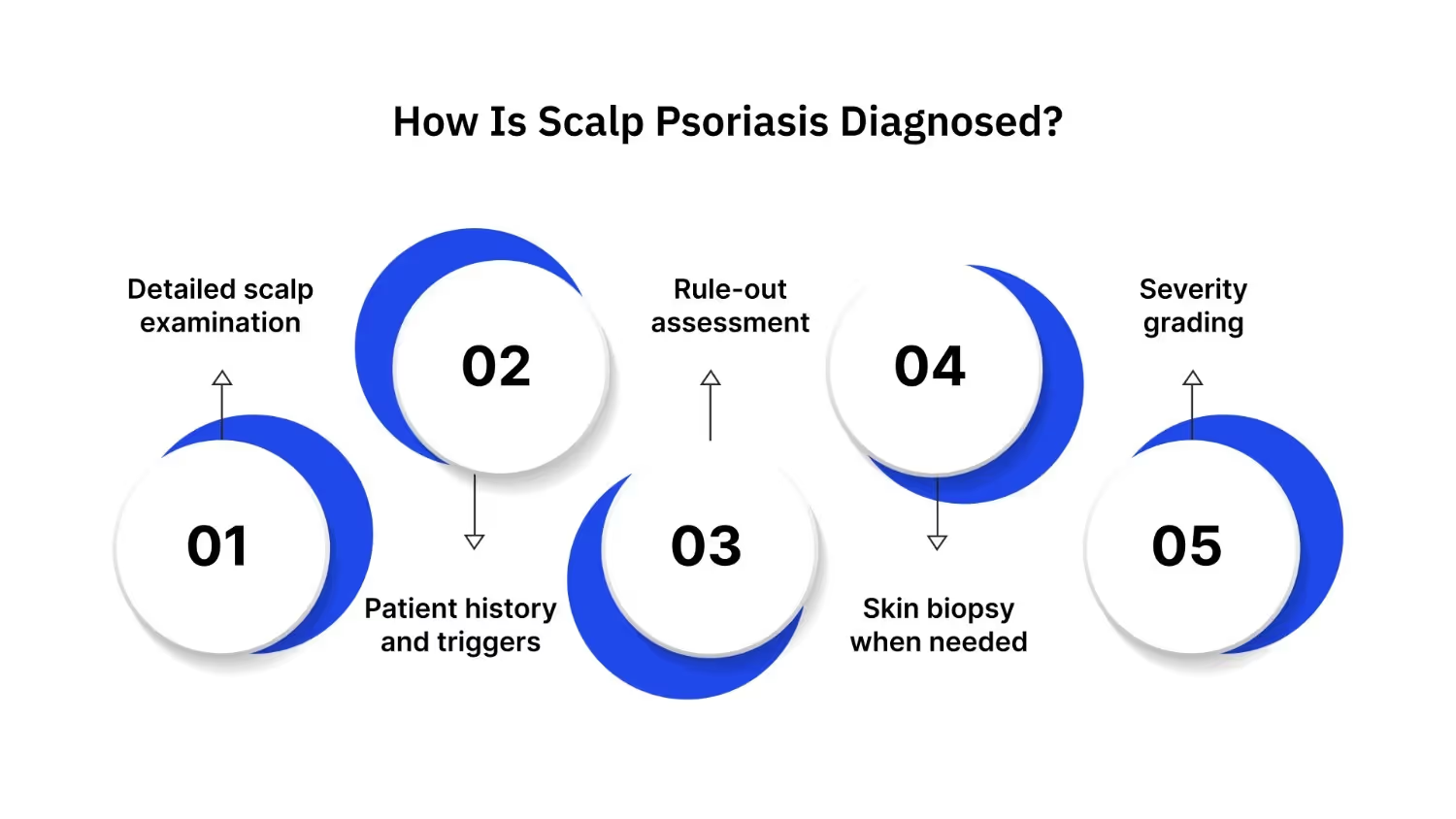
Scalp psoriasis often looks similar to common scalp conditions like dandruff or eczema, which makes professional diagnosis essential. You can't rely on home remedies or guesswork, because effective scalp psoriasis treatment depends on correctly identifying the problem.
A dermatologist uses both observation and medical testing to confirm the condition and plan the right treatment path.
Here's how the diagnosis process usually works:
- Detailed scalp examination: Your dermatologist checks for common signs such as raised plaques, silvery-white scaling, and redness that often spread beyond the scalp's edge.
- Patient history and triggers: Questions about your family background, flare-up frequency, and lifestyle changes like stress or medication help pinpoint likely causes.
- Rule-out assessment: Conditions such as seborrheic dermatitis, eczema, or fungal infections mimic psoriasis but show different flake patterns and responses to treatment.
- Skin biopsy when needed: If symptoms are unclear, a small tissue sample may be tested under a microscope to confirm psoriasis at a cellular level.
- Severity grading: The dermatologist assesses the thickness of plaques, scalp coverage, and itching severity to classify your case as mild, moderate, or severe.
Once your diagnosis is confirmed, the next step is to understand what happens if scalp psoriasis is left untreated.
Potential Complications If Left Untreated
Ignoring scalp psoriasis can do more than cause discomfort; it may also worsen your symptoms over time and impact your overall well-being. Without timely scalp psoriasis treatment, the condition can progress and lead to physical, emotional, and social challenges that interfere with daily life.
Here are the common complications you should be aware of:
- Thickening and spreading of plaques: Mild patches can gradually expand into large, stubborn plaques that harden and often spread to the hairline, forehead, or behind the ears, making treatment more complex.
- Increased risk of infections: Continuous scratching causes cracks and open sores on the scalp, creating an easy entry point for bacteria or fungi that may lead to painful, oozing infections.
- Hair loss from scalp damage: Inflammation around the hair follicles weakens them, while frequent scratching or aggressive combing causes noticeable hair thinning or temporary bald spots.
- Emotional and psychological distress: Constant flaking and visible redness can make you self-conscious, often leading to social withdrawal, heightened stress, or even depression over time.
- Disrupted sleep and daily routines: Severe itching and burning sensations may keep you awake at night, leaving you fatigued and less productive during work or regular activities.
Recognising these complications highlights why it's essential to address scalp psoriasis early. Thankfully, there are effective topical treatment options that often provide the first line of relief.
Topical Treatment Options
For many people, topical treatments are the first step in managing scalp psoriasis. These medications are applied directly to your scalp and help reduce scaling, itching, and inflammation. They're especially useful for mild to moderate cases and can make daily life more comfortable while slowing down flare-ups.
Here are the most common topical options your dermatologist may recommend:
- Medicated shampoos with coal tar or salicylic acid: Coal tar helps slow down rapid skin cell growth, while salicylic acid softens thick scales so they can be removed more easily during washing.
Pro tip: Apply shampoo directly to the scalp and leave it for 5–10 minutes before rinsing to maximise effectiveness.
- Topical corticosteroid creams and solutions: These reduce inflammation and itching quickly, especially when applied directly to red, raised patches that don't respond to regular shampoos.
- Vitamin D analogues (like calcipotriol): These prescription treatments work by slowing the overproduction of skin cells, often used alongside steroids for a stronger combined effect.
- Moisturising scalp lotions or oils: By softening plaques and hydrating dry skin, they make medicated treatments penetrate deeper and reduce tightness or soreness.
- Combination therapies: In some cases, dermatologists recommend rotating between shampoos, steroid lotions, and vitamin D analogues to control flare-ups more effectively.
Topical treatments often provide significant relief, but in moderate to severe cases, you may need advanced medical options for long-term control. Let's look at what those involve.
Advanced and Prescription Treatments
When scalp psoriasis doesn't respond well to shampoos or topical creams, advanced medical treatments become necessary. These options are designed for moderate to severe cases and work by targeting the immune system or slowing excessive skin cell growth.
Your dermatologist will decide on these based on the severity of your symptoms, your overall health, and how well you've responded to earlier treatments.
Here are the advanced options commonly used in scalp psoriasis treatment:
- Phototherapy (light therapy): This involves exposing the scalp to controlled doses of UVB light, which helps slow down cell turnover.
Example: A patient with widespread scalp plaques may undergo weekly phototherapy sessions that gradually reduce scaling and redness over time.
- Oral medications: Drugs such as methotrexate, cyclosporine, or acitretin help control immune overactivity. They are powerful and effective, but require regular blood tests to monitor potential side effects on the liver or kidneys.
- Biologic injections: These newer treatments (like adalimumab, ustekinumab, or secukinumab) target specific immune proteins responsible for inflammation. They are often used when traditional oral drugs or phototherapy fail to provide lasting relief.
- Targeted combination therapies: Sometimes dermatologists prescribe a combination of oral medication and topical care to speed up recovery while minimising side effects.
- Close monitoring and follow-ups: Unlike shampoos, these treatments require strict medical supervision to balance effectiveness with safety, making regular check-ups an essential part of care.
Pro tip: Always discuss your lifestyle and medical history with your dermatologist before starting systemic or biologic treatments; it helps them choose the safest and most effective option for you.
While advanced treatments can bring lasting relief, you can also make daily choices at home to support your scalp health. Next, let's look at the lifestyle and home remedies that can complement medical care.
Lifestyle and Home Remedies
Along with medical treatments, your everyday habits play a big role in managing scalp psoriasis. Small lifestyle adjustments can reduce flare-ups, ease discomfort, and make your prescribed scalp psoriasis treatment more effective. These remedies don't cure psoriasis, but can significantly improve how manageable it feels day to day.
Here are some practical steps you can take at home:
- Gentle hair care routines: Use mild, fragrance-free shampoos and avoid harsh styling products. Strong gels, sprays, or dyes can irritate plaques and trigger flare-ups.
- Scalp-friendly moisturisation: Regularly applying light oils or non-irritant moisturisers helps keep scales soft and reduces the tight, dry feeling on the scalp.
Example: Warm olive oil left on the scalp overnight can soften thick plaques before washing.
- Stress management practices: Stress is a known trigger for psoriasis flare-ups. Activities like meditation, yoga, or even short daily walks can help lower stress hormones and improve skin balance.
- Balanced anti-inflammatory diet: Including foods like salmon, flaxseeds, and leafy greens provides omega-3s and antioxidants that support healthy skin cell function. Limiting processed or high-sugar foods may also reduce flare severity.
- Protecting the scalp from weather extremes: Cold winds and dry air often worsen symptoms. Wearing a soft scarf or cap outdoors in winter helps reduce irritation and dryness.
Pro tip: When brushing or combing your hair, use a wide-toothed comb and apply gentle strokes to avoid loosening scales too aggressively, which can lead to bleeding or infections.
Lifestyle care works best when paired with professional medical advice. Up next, let's address a common concern: how scalp psoriasis differs from dandruff and why treating it like dandruff often fails.
Also Read: Psoriasis Treatment Diet: Expert Tips to Manage Your Skin Through Nutrition
Scalp Psoriasis vs Dandruff: Know the Difference
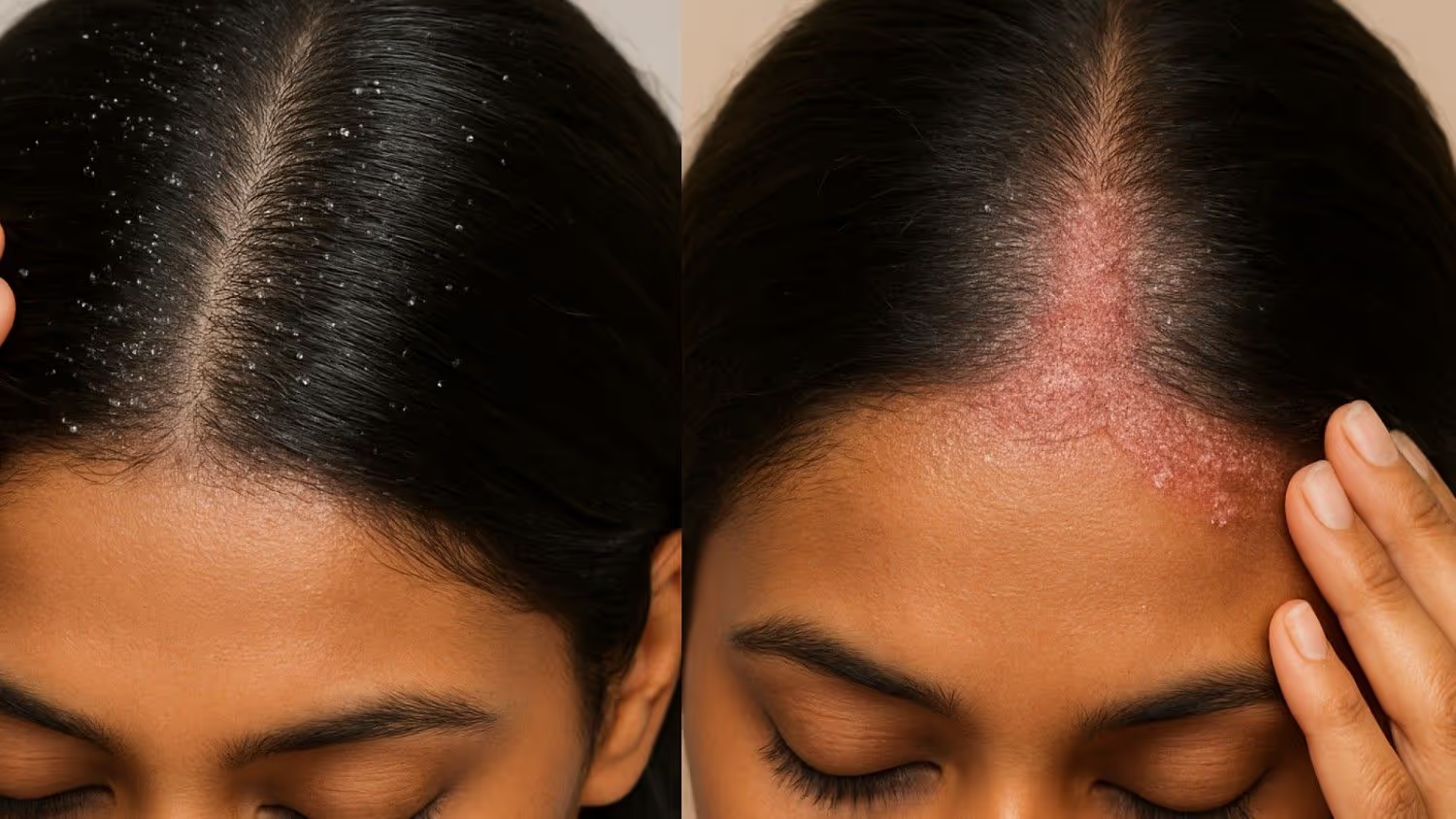
Many people confuse scalp psoriasis with dandruff because both cause flaking and itching. However, the two conditions are very different in their causes, appearance, and how they respond to treatment. Knowing the difference ensures you don't waste time on ineffective dandruff remedies when you actually need scalp psoriasis treatment.
Here's how they differ:
- Cause: Dandruff is usually caused by excess oil production and an overgrowth of yeast (Malassezia), while scalp psoriasis is an autoimmune condition where your body produces skin cells too quickly.
- Flake type and appearance: Dandruff flakes are small, oily, and yellowish-white, often falling easily onto your shoulders. Psoriasis flakes are thicker, silvery-white, and cling stubbornly to the scalp and hair shafts.
- Extent of coverage: Dandruff is mostly limited to the scalp, but scalp psoriasis often spreads beyond the hairline to the forehead, back of the neck, or around the ears.
- Associated symptoms: Dandruff causes itching and mild irritation, while scalp psoriasis brings redness, soreness, and, in some cases, temporary hair loss due to inflammation and scratching.
- Response to treatment: Dandruff usually improves with anti-fungal shampoos, but psoriasis requires structured medical treatments such as topical steroids, vitamin D analogues, or advanced biologics.
If your scalp issues haven't improved after months of using anti-dandruff shampoos, it's likely more than dandruff. Velantis Dermatology, led by Dr. Janani Sree C M, offers ethical, evidence-based care for scalp conditions.
Book a consultation with our MD Dermatologist today to get the right diagnosis and start effective treatment.
Read Next: Laser Treatment for Psoriasis: Types, Working Cost, & Risks
Conclusion: When to See a Dermatologist
Scalp psoriasis is more than just a stubborn flaking condition; it's an autoimmune disorder that can cause redness, itching, thick plaques, and even temporary hair loss if left untreated. By understanding its symptoms, causes, complications, and available scalp psoriasis treatment options, you can take the right steps to control flare-ups and improve your scalp health.
At Velantis Dermatology, every treatment is provided by Dr. Janani Sree C M, an experienced MD dermatologist. From topical care and advanced biologics to lifestyle guidance and pigmentation or acne management, Velantis offers ethical, evidence-based solutions personalized to your needs.
Contact Velantis Dermatology today to begin your treatment journey with trusted medical expertise.
FAQs
Q. How effective is scalp psoriasis treatment?
A. Effectiveness depends on severity; mild cases often improve with medicated shampoos, while advanced psoriasis may need biologics for longer remission periods.
Q. How long does it take to see results from treatment?
A. Some topical treatments show improvement within 2–4 weeks, while systemic medications and biologics may take a few months for visible, lasting results.
Q. Are there any risks involved with advanced treatments?
A. Oral drugs and biologics may carry risks like liver strain or lowered immunity, which is why regular check-ups and dermatologist monitoring are essential.
Q. What are the costs of treating scalp psoriasis?
A. Costs vary depending on treatment type; medicated shampoos are affordable, while biologics and phototherapy can be more expensive and require planning.
Q. Can scalp psoriasis come back after treatment?
A. Yes, since psoriasis is chronic, flare-ups can return. However, ongoing care, lifestyle adjustments, and follow-ups reduce recurrence and improve quality of life.
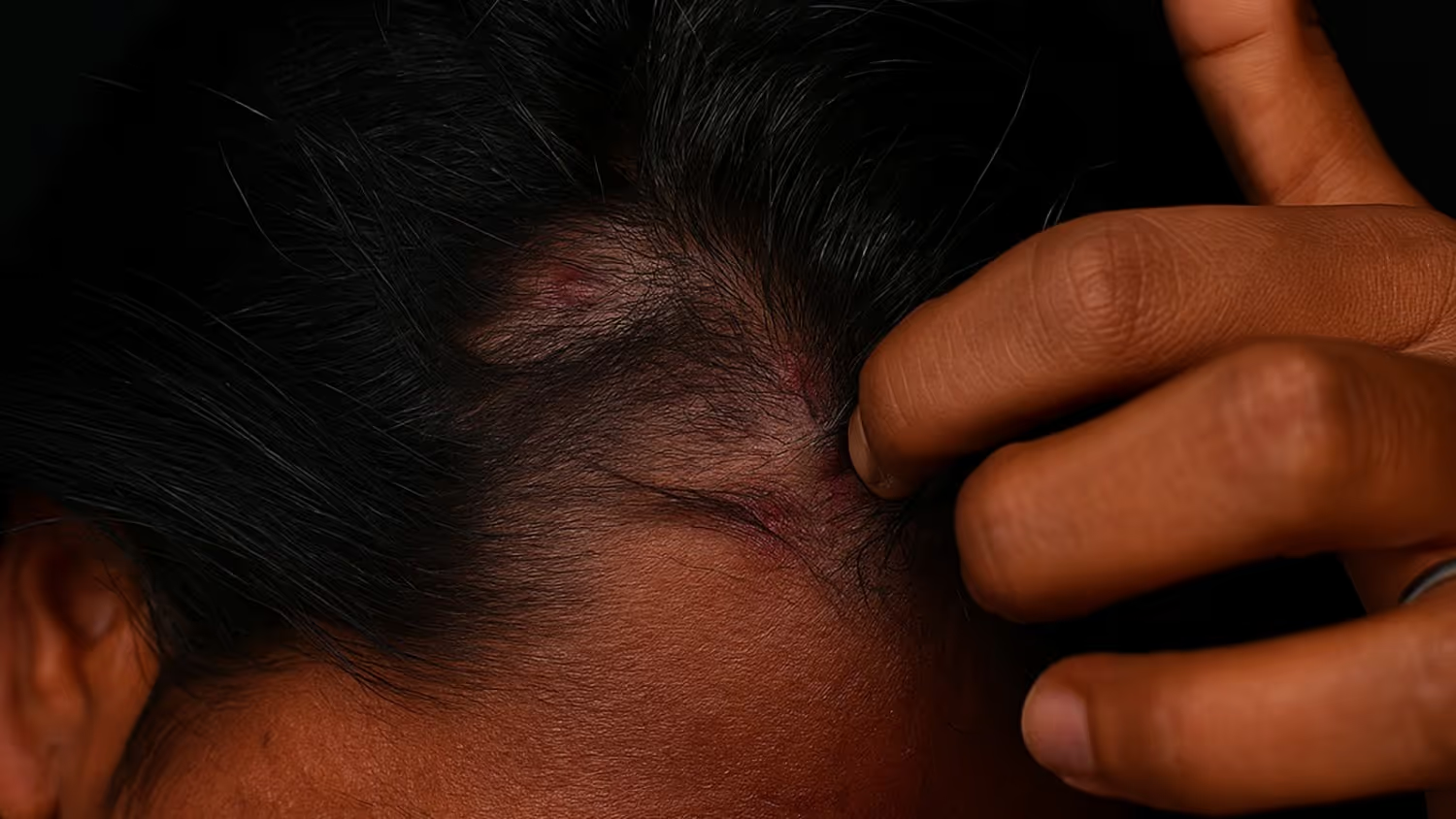

.png)
